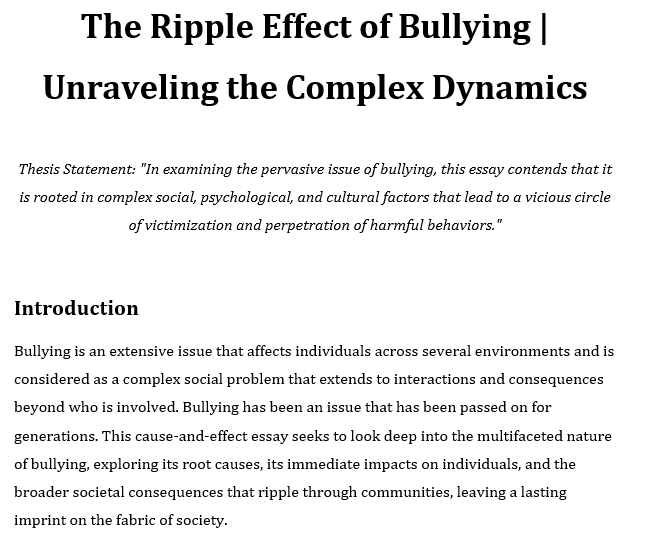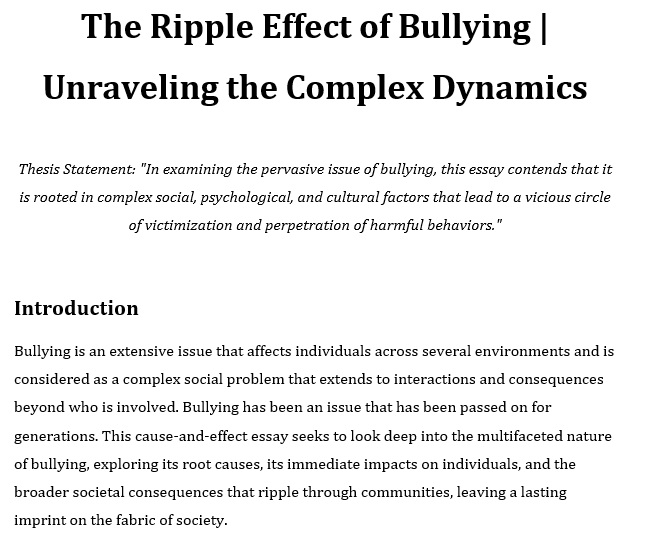1st Example of Cause and Effect Essay about Social Media:
Topic: Looking Beyond the Digital World: The Hidden Impact of Social Media on Societal Values
Introduction:
Social media has revolutionized the way people connect, communicate, and interpret their surroundings. With technological advancement, it continues to have more profound effects on society’s fundamental values (1). From shaping individual identity to impacting core values, the effects of social media are beyond the digital world (2). This causes and effects of social media essay unveils the hidden impact of social media on society’s fundamental values that govern our interactions and behaviors with others.
Transforming Modes of Communication:
In the era of digital communication, social media has played a crucial role in providing digital platforms that have enhanced global connectivity and allowed seamless information exchange. With just one click, people can communicate with anyone around the globe thus developing a sense of association and inclusivity in them (3).However, a rapid switch to virtual modes of communication has led to a significant reduction in in-person interactions (4). But this ease of digital communication comes at the cost of face-to-face conversations thus questioning the worthiness of relationships.
Harnessing Self-identity and Expectations:
Not only this, social media has significantly harnessed sound development of personal identity among its users. The rise of influencer culture on many social platforms has triggered stress and competition among its followers to achieve the ideal body, unrealistic beauty standards, and charming lifestyles (5). As a result, the majority of followers have been reported to have low self-esteem and do not feel confident about their bodies (6). Moreover, the frequent encounter with filtered and flawless content has elevated societal expectations and beauty standards thus cultivating a sense of inferiority and discontentment among users (7).
Shaping Consumer Culture and Cyber-activism
Apart from shaping personal identity, social platforms have direct and indirect effects on societal values and norms. Many content creators advertise PR packages to give exposure to a brand; however, little do they know that this act not only promotes consumer culture but also fuels materialism and conspicuousness within society (8). Social media has a constructive role in advocating social reform by giving a voice to marginalized populations and encouraging social campaigns (9). However, the constantly evolving nature of cyber activism raises questions about its credibility and feasibility in bringing prominent societal reforms.
Psychological Implications and Digital Toxicity:
The adverse effects of social media on human psychology cannot be ignored. The frequent exposure to high-quality content, the pressure to come up with creative content, and the desire to conform to society have resulted in numerous psychological and emotional concerns like anxiety (10), loneliness, depression (11), etc. Also, the increased rate of cyber-bullying and digital harassment has further aggravated the situation resulting in digital toxicity which has detrimental effects on the mental stability of individuals (12).
Educational Realm and Social Media:
When it comes to education, research shows that social media has completely transformed conventional learning methods by offering innovative ways to acquire knowledge and solve problems. However, using social media for educational purposes has faded the line between entertainment and learning (13) thus making it difficult to reap its potential benefits and mitigate its adverse effects on student’s focus and academic performance.
Social Media and Political Sphere:
On the other side, digital platforms like Facebook and other web pages play a crucial role in disseminating information. This rapid spread of information has not only enhanced global connectivity but also enabled political leaders and social personalities to interact with the general public. However, the unregulated flow of information, the circulation of misleading information, and ideological extremes among political parties have adversely affected the nation’s integrity thus calling for better apprehension of information and ethical social engagement.
Transformation of Family Dynamics and Well-being:
Besides this, the ubiquitous nature of social media has completely changed household dynamics thus changing the ways family members communicate and interact with one another. The increased screen time has entirely changed the concept of family time; while family members engage in online activities they fail to engage in face-to-face conversations (14). Furthermore, parents are concerned about the increased screen time among children and seek ways to strike a balance between the real and digital world.
Social Media and Work place Culture:
Lastly, the influence of social media in the realm of professional careers is undeniable, as it has significantly transformed work practices (15) and workplace culture (16). With the increase in remote jobs, social media has provided innovative opportunities to connect geographically dispersed employees thus allowing seamless communication and transfer of ideas. However, frequent exposure to social media and its content has raised concerns about its impacts on employee staffing, productivity, and development (17).
Societal Reforms and Solutions:
To address the negative effects of social media, different initiatives are undertaken to promote media literacy and responsible digital engagement. Among these campaigns, educational campaigns have gained immense popularity. Such campaigns are designed to equip individuals with the necessary skills thus promoting responsible digital behavior. Also, the promotion of initiatives that aim to enhance mental well-being by providing media literacy is essential for combating the adverse effects of social media.
Setting up Online Communities:
The detrimental effects of social media can be minimized by setting up online communities and support groups where individuals can share their experiences and help others in creating meaningful connections. Also, this will help solace individuals with common challenges, thus creating a sense of association and inclusivity within the digital world. However, ensuring the authenticity and inclusiveness of these support groups is a constant challenge, as social groups can be manipulated and misused.
Promoting Ethical Digital Conduct:
For responsible social engagement, it is necessary to promote media literacy and adopt transparent and accountable digital practices that will help create a healthy digital environment. By encouraging individuals and organizations to opt for ethical digital conduct we can curtail the growth of unethical content and promote the development of digital communities.
Emphasizing Balance Between Technology and Human Connections:
While society continues to explore the digital world, it is important to keep a balance between technological advancement and human interactions. Emphasizing the importance of human interactions and retaining meaningful connections within the digital world will help to promote a culture of empathy and respect. Moreover, using social media to advocate social change by giving a voice to marginalized populations will promote social development.
Conclusion:
In a nutshell, the hidden impact of social media on society’s values has completely transformed the way individuals perceive themselves and interact with others within society. From changing household dynamics to affecting societal norms, social media’s influence goes beyond the screen and affects different aspects of contemporary life. While social media offers innumerable connectivity benefits to its users, underlining and addressing its adverse effects on societal values is crucial to gaining a better understanding of practices that promote a health digital environment based on principles of authenticity, respect, empathy, and ethical conduct.
Cause and Effect Essay Example About Social Media # 2:
Topic: The Impact of Social Media on Mental Health
Thesis Statement: “In examining the impact of social media on mental health, this cause and effect essay seeks to elaborate on the multifaceted relationship between online platforms and psychological well-being. Through an exploration of factors such as cyberbullying, social comparison, and addictive behaviors, the thesis aims to unveil both the detrimental effects and potential mitigating strategies, contributing to a comprehensive understanding of the intricate interplay between social media use and mental health outcomes.”
Introduction
In the advanced era of today, social media has become a vital part of our routine lives, revolutionizing the way we communicate, share knowledge and connect with our friends and family. With the advent of social media, it brought along several benefits but the influence of social media has brought some consequences of its pervasive nature into the limelight, especially pertaining to mental health.
This is a cause and effect essay that explores the relationship between social media usage and its impact on mental well-being. Below mentioned are some factors that explained in detail the cause and its related effect.
1. Cause – Social Comparison and Envy
One of the most prominent negative impacts of social media on mental health is the concept of social comparison. Platforms like Instagram and Facebook often portray curated versions of people’s lives, emphasizing their achievements, possessions, and happy moments. These postings meticulously miss out on the difficulties and challenges of life, which in turn portrays an image that is far from reality. As users scroll through these idealized representations, they may experience feelings of inadequacy and envy.
Effect – Low Self-Esteem and Depression
Constant and continuous exposure to seemingly perfect lives on social media can contribute to a decline in self-esteem. Individuals browsing around social media may begin to perceive their own lives as inferior, leading to feelings of depression and inadequacy. Research indicates a correlation between high social media use and increased rates of depression and anxiety among users.
2. Cause – Cyberbullying and Online Harassment
Another major cause of mental health issues regarding social media is the prevalent online harassment and cyberbullying. Users take advantage of being anonymous and tend to engage in harmful behavior and hurting comments without being faced with instant consequences.
Effect – Anxiety and Psychological Distress
The victims who fall prey to online harassment and cyberbullying usually experience heightened anxiety levels and suffer from psychological distress. The constant fear of being targeted online can lead to a reluctance to express oneself authentically, fostering a culture of conformity and stifling individuality. Although this affects people from all walks of life, the young generation, given their naive nature are more prone to be a victim of online harassment and cyberbullying.
3. Cause – Fear of Missing Out (FOMO)
The fear of missing out, or FOMO, is a pervasive phenomenon exacerbated by social media. Users often witness their peers engaging in exciting activities or social events, contributing to a sense of exclusion. Given the era we are living in, it’s all about following the trend and keeping yourself updated with the current happenings. Social media is one such factor that keeps you updated by the minute of real time happenings around the globe.
Effect – Anxiety and Social Isolation
The perpetual exposure to the vibrant social lives of others can intensify feelings of anxiety and isolation for those who perceive themselves as missing out. This can lead to a cycle of increased social media use in an attempt to stay connected, further exacerbating mental health issues. There’s no harm in being connected to the world, but social media users tend to be on top of it, which makes their brain work super fast which eventually makes them anxious.
4. Cause – Social Media Addiction
The addictive nature of social media platforms, designed to keep users engaged for extended periods, is a significant cause of mental health issues. Features like endless scrolling, notifications, and the constant stream of new content create a dopamine-driven feedback loop that can lead to compulsive behavior. This is very harmful for young people who are unable to figure out how much social media exposure is too much.
Effect: Sleep Disruption and Impaired Productivity
Excessive use of social media, especially before bedtime, can disrupt sleep patterns. The blue light emitted by screens suppresses melatonin production, leading to difficulty falling asleep. Sleep deprivation, in turn, can impair cognitive function, decrease productivity, and contribute to heightened stress levels and irritability. People have started using the smart phones just before bedtime considering it an unwinding technique and an unhealthy me time. This is why people are physically present in places the next morning but their minds are partially asleep and partially hooked to the fast paced social media.
5. Cause – Filter Bubbles and Echo Chambers
You must have experienced your social media feed full of the topics or things that you have been searching for. Social media algorithms are designed to show users content that aligns with their existing preferences and beliefs. While this aims to enhance user experience, it often results in the formation of filter bubbles and echo chambers, limiting exposure to diverse perspectives. For instance if you search for winter clothes, your feed would start showing you top brands that have their latest winter collections out or the ones that are on sale.
Effect – Polarization and Closed-mindedness
When individuals are primarily exposed to information that reinforces their existing beliefs, it can lead to polarization and closed-mindedness. This narrowing of perspectives can contribute to social division and intolerance as users become less receptive to alternative viewpoints, hindering constructive dialogue and understanding.
Conclusion
In conclusion, the multifaceted impact of social media on mental health is influenced by various interconnected factors. Recognizing and understanding these causes and effects is crucial for individuals to navigate the digital landscape in a way that promotes mental well-being and fosters a healthier online environment.
While social media offers unparalleled connectivity and information sharing, its impact on mental health cannot be overlooked. The cause-and-effect relationship between social media usage and mental well-being reveals the need for individuals to approach these platforms mindfully. Striking a balance between online and offline life, promoting positive online behaviors, and fostering a culture of authenticity can contribute to a healthier relationship between social media and mental health.
References
This is Izzah, a content writer and editor who creates SEO-friendly content and has experience in academic writing. Backed by 10 years of experience in writing and editing, she is equipped with the skill to create content that is backed by thorough research and has impeccable structure.




